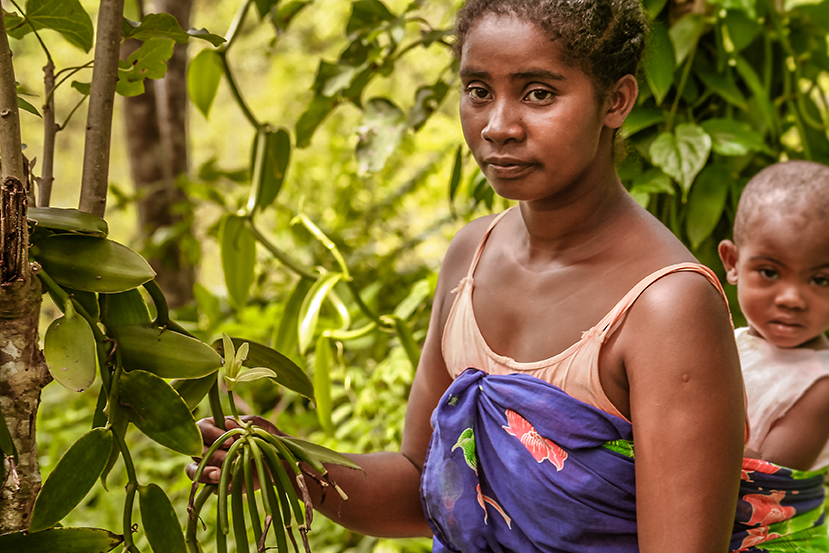How Can Sustainability Standards Contribute to Empowering Women’s Food Security?
Food security is an intersectional issue and development organizations can use voluntary sustainability standards (VSSs) to contribute to empowering women’s food security in agriculture.
Gender power hierarchies in rural households mean women have secondary access to food.
Women provide 85 to 90 per cent of the time required for household food preparation. While they strive to ensure nutritional needs are met within their families, their own access to food suffers due to gender norms, as they prioritize the nutrition of children and men above their own.

In times of crisis, women also suffer from food insecurity at greater rates than men in most countries. Shockingly, this can also be the case for pregnant or lactating women with anemia, affecting 38 per cent of pregnant women.
Food security is an intersectional issue. It touches on income, poverty, access to resources, gender-based discrimination and health.
With food security being critical to so many facets of a woman’s livelihoods, how can development organizations utilize voluntary sustainability standards (VSSs) to contribute to empowering women’s food security in agriculture?
Foster sustainable production practices that contribute to diverse and nutritional diets
VSSs can contribute to food security through sustainable production requirements, making new sources of subsistence crops available. One example is, when shade requirements within several coffee certifications are followed, new sources of nutrient-dense foods, like bananas, become available for women and their households.
In many areas of agriculture, men and women are also responsible for different crops due to the gender division of labour. Development organizations working on the ground can promote food security and women’s empowerment by promoting the use of female-grown crops. This includes the new, nutrient-dense crops, such as bananas.
Promote women’s financial decision making and independence
According to research, certified producers, such as those growing organic or Fairtrade crops, can sometimes earn 7 per cent higher net income than non-certified producers due to productivity increases and price premiums.
Higher incomes can be linked to improved food security. In Uganda, for example, certified producers consumed 19 per cent more calories, 35 per cent more iron and 48 per cent more zinc than non-certified households because of the improved soil fertility in their crops, which they are able to grow due to their increased incomes. However, these nutritional advantages tend to disappear when men control the household income. This is likely due to the differences in how men and women manage household finances: women tend to invest their funds back into the household and crops, while this isn’t always the case for men.
Development organizations working with farmers and agricultural communities can take a gender-transformative approach to encouraging gender-equal food security in households by working with men and women in agriculture to promote women’s decision making around household income and their economic independence.
Conduct gender impact assessments to reduce cash crop incentivizing
VSSs can inadvertently incentivize cash cropping, the practice of creating agricultural crops for their commercial or financial value, often for export, as opposed for individual consumption. Cash crops are typically overseen by men, therefore unintentionally reinforcing gender biases.
Development organizations working with farmers and agricultural communities should invest time in learning local gender dynamics and developing a gender-impact assessment when considering certification programs for agricultural producers and smallholders to ensure women’s food security and income are not jeopardized by converting their lands into cash crops.
By using VSSs as a development tool and implementing them in a gender-sensitive way, development organizations can foster women’s food security, economic independence and health.
To learn more, read our report, Leveraging Voluntary Sustainability Standards for Gender Equality and Women’s Empowerment in Agriculture: A Guide for Development Organizations Based on the Sustainable Development Goals.
You might also be interested in
Promoting the Development of Agricultural Cooperatives
Governments in the Global South should promote agricultural cooperatives to boost smallholder access to fair markets, finance, and climate resilience.
Addressing Soil Acidity and Enhancing Soil Health
This policy report addresses the critical issue of soil acidity in the East African Community (EAC) and provides actionable recommendations for EAC partner states, the EAC Secretariat, and other relevant stakeholders.
Women Turning the Table on Food Loss and Waste in Kenya
A group of changemakers led a movement to tackle food loss and waste in Kenya. IISD experts have been working closely with local women leaders to make change happen.
The Case of Eco-Certification in Manitoba's Commercial Fisheries
Manitoba commercial fisheries stand to benefit from obtaining eco-certification.
